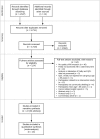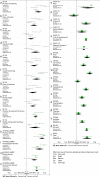Quality of life is substantially worse for community-dwelling older people living with frailty: systematic review and meta-analysis
- PMID: 30875008
- PMCID: PMC6620381
- DOI: 10.1007/s11136-019-02149-1
Quality of life is substantially worse for community-dwelling older people living with frailty: systematic review and meta-analysis
Abstract
Purpose: Frailty is an important predictor of adverse health events in older people, and improving quality of life (QOL) is increasingly recognised as a focus for services in this population. This systematic review synthesised evidence of the relationship between frailty and QOL in community-dwelling older people, with an emphasis on how this relationship varied across QOL domains.
Methods: We conducted a systematic review with meta-analysis. We searched five databases for reports of QOL in older people with frailty and included studies based on pre-defined criteria. We conducted meta-analyses comparing "frail" and "not frail" groups for each QOL scale where data were available. We compared pooled results to distribution-based and known-group differences to enhance interpretation. We summarised reported cross-sectional and longitudinal analyses.
Results: Twenty-two studies (24,419 participants) were included. There were medium or larger standardised mean differences for 24 of 31 QOL scales between frail and not frail groups, with worse QOL for frail groups. These scales encompassed constructs of health-related quality of life as well as psychological and subjective well-being. There were similar findings from mean difference meta-analyses and within-study analyses.
Conclusions: The association between frailty and lower QOL across a range of constructs is clear and often substantial. Future research should establish whether causal mechanisms link the constructs, which aspects of QOL are most important to older people with frailty, and investigate their tractability. Services focused on measuring and improving QOL for older people with frailty should be introduced.
Keywords: Frailty; Health-related quality of life; Psychological well-being; Quality of life; Subjective well-being; Systematic review.
Conflict of interest statement
The authors declare that they have no conflict of interest.
Figures
Similar articles
-
The association between frailty and quality of life among rural community-dwelling older adults in Kegalle district of Sri Lanka: a cross-sectional study.Qual Life Res. 2019 Aug;28(8):2057-2068. doi: 10.1007/s11136-019-02137-5. Epub 2019 Feb 27. Qual Life Res. 2019. PMID: 30810884
-
The Impact of Frailty on the Relationship between Life-Space Mobility and Quality of Life in Older Adults during the COVID-19 Pandemic.J Nutr Health Aging. 2021;25(4):440-447. doi: 10.1007/s12603-020-1532-z. J Nutr Health Aging. 2021. PMID: 33786560 Free PMC article.
-
The Association between Frailty, Quality of Life and Resilience in Community-dwelling Retirement Village Residents.J Am Med Dir Assoc. 2024 Nov;25(11):105256. doi: 10.1016/j.jamda.2024.105256. Epub 2024 Sep 11. J Am Med Dir Assoc. 2024. PMID: 39270735
-
Transitions between frailty states among community-dwelling older people: A systematic review and meta-analysis.Ageing Res Rev. 2019 Mar;50:81-88. doi: 10.1016/j.arr.2019.01.010. Epub 2019 Jan 16. Ageing Res Rev. 2019. PMID: 30659942
-
Effects of exercise with music in frail older adults: a systematic review and meta-analysis.BMJ Open. 2025 Apr 30;15(4):e095602. doi: 10.1136/bmjopen-2024-095602. BMJ Open. 2025. PMID: 40306988 Free PMC article.
Cited by
-
Multidimensional frailty and quality of life: data from the English Longitudinal Study of Ageing.Qual Life Res. 2022 Oct;31(10):2985-2993. doi: 10.1007/s11136-022-03152-9. Epub 2022 May 17. Qual Life Res. 2022. PMID: 35579730 Free PMC article.
-
Serum klotho levels and mortality patterns in frail individuals: unraveling the u-shaped association.Aging Clin Exp Res. 2024 Apr 11;36(1):92. doi: 10.1007/s40520-024-02730-w. Aging Clin Exp Res. 2024. PMID: 38602574 Free PMC article.
-
Longitudinal Association of Olfactory Function with Frailty in Older Adults: The Atherosclerosis Risk in Communities Study.J Gerontol A Biol Sci Med Sci. 2025 Mar 7;80(4):glaf018. doi: 10.1093/gerona/glaf018. J Gerontol A Biol Sci Med Sci. 2025. PMID: 39886987
-
Physical Frailty in COPD Patients with Chronic Respiratory Failure.Int J Chron Obstruct Pulmon Dis. 2021 May 17;16:1381-1392. doi: 10.2147/COPD.S295885. eCollection 2021. Int J Chron Obstruct Pulmon Dis. 2021. PMID: 34045852 Free PMC article.
-
Transitions in frailty state 12 months after kidney transplantation: a prospective cohort study.J Nephrol. 2022 Dec;35(9):2341-2349. doi: 10.1007/s40620-022-01436-4. Epub 2022 Sep 1. J Nephrol. 2022. PMID: 36048368
References
-
- Costanza R, Fisher B, Ali S, Beer C, Bond L, Boumans R, et al. Quality of life: An approach integrating opportunities, human needs, and subjective well-being. Ecological Economics. 2007;61:267–276. doi: 10.1016/j.ecolecon.2006.02.023. - DOI
-
- Galloway S, Bell D, Hamilton C, Scullion A. Well-being and quality of life: Measuring the benefits of culture and sport-a literature review and thinkpiece. Edinburgh: Social Research); 2006.
-
- Andelman, R., Board, R., Carman, L. L., Cummins, R. A., Ferriss, A., Friedman, P., et al. (1998). Quality of life definition and terminology: A discussion document from the International Society for Quality of Life Studies: The International Society for Quality-of-Life Studies (ISQOLS).
-
- World Health Organization . World report on ageing and health. Geneva: World Health Organization; 2015.
Publication types
MeSH terms
LinkOut - more resources
Full Text Sources



